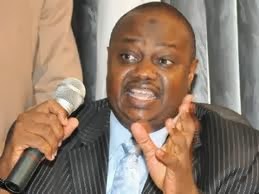EFCC solicits media support in combating corruption, economic crimes
(Nigeria) The Economic and Financial Crimes Commission, EFCC, on Monday solicited the support of the Nigerian media in
combating corruption and economic crimes.
The EFCC Chairman, Mr Ibrahim Lamorde, made the appeal in Lagos at a workshop organised by the commission for journalists.
Lamorde, who was represented by EFCC's Director of Operations, Mr Olaolu Adegbite, said that the media's potential to inform and educate the public was crucial to the agency’s anti-graft war.
He said that the commission would not be able to win the war against corruption without the support of members of the Nigerian public.
"We need the media to help to sensitise the people to the ills of corruption and economic crimes," the EFCC chairman said.
He urged media professionals to use their investigative skills to help the commission to fight corruption.
Lamorde said that the aim of the workshop was to enhance the capacity of journalists in reporting sensitive cases of corruption and economic crimes.
In his lecture, Mr Azubuike Ishiekwene, the Group Managing Director, Leadership Newspapers, urged journalists to always abide by the ethics of their profession.
Ishiekwene's lecture was entitled "Ethical Journalism and Reporting Economic and Financial Crimes: Realities, Challenges and Ideals".
He urged the participants to be fair, balanced and objective in their reports, and advised that the rights of persons being prosecuted for alleged economic crimes should be respected.
``The presumption of innocence until conviction by a competent court of law is a right every suspect enjoys in all civilised climes.
"The Nigerian media must take a cue from this; it is an important part of balancing the risks of libel or slander.
``It is a veritable element to the pursuit of ethical journalism in its ideal form, which must be the media's benchmark," Ishiekwene said.
Lamorde, who was represented by EFCC's Director of Operations, Mr Olaolu Adegbite, said that the media's potential to inform and educate the public was crucial to the agency’s anti-graft war.
He said that the commission would not be able to win the war against corruption without the support of members of the Nigerian public.
"We need the media to help to sensitise the people to the ills of corruption and economic crimes," the EFCC chairman said.
He urged media professionals to use their investigative skills to help the commission to fight corruption.
Lamorde said that the aim of the workshop was to enhance the capacity of journalists in reporting sensitive cases of corruption and economic crimes.
In his lecture, Mr Azubuike Ishiekwene, the Group Managing Director, Leadership Newspapers, urged journalists to always abide by the ethics of their profession.
Ishiekwene's lecture was entitled "Ethical Journalism and Reporting Economic and Financial Crimes: Realities, Challenges and Ideals".
He urged the participants to be fair, balanced and objective in their reports, and advised that the rights of persons being prosecuted for alleged economic crimes should be respected.
``The presumption of innocence until conviction by a competent court of law is a right every suspect enjoys in all civilised climes.
"The Nigerian media must take a cue from this; it is an important part of balancing the risks of libel or slander.
``It is a veritable element to the pursuit of ethical journalism in its ideal form, which must be the media's benchmark," Ishiekwene said.




Comments
Post a Comment